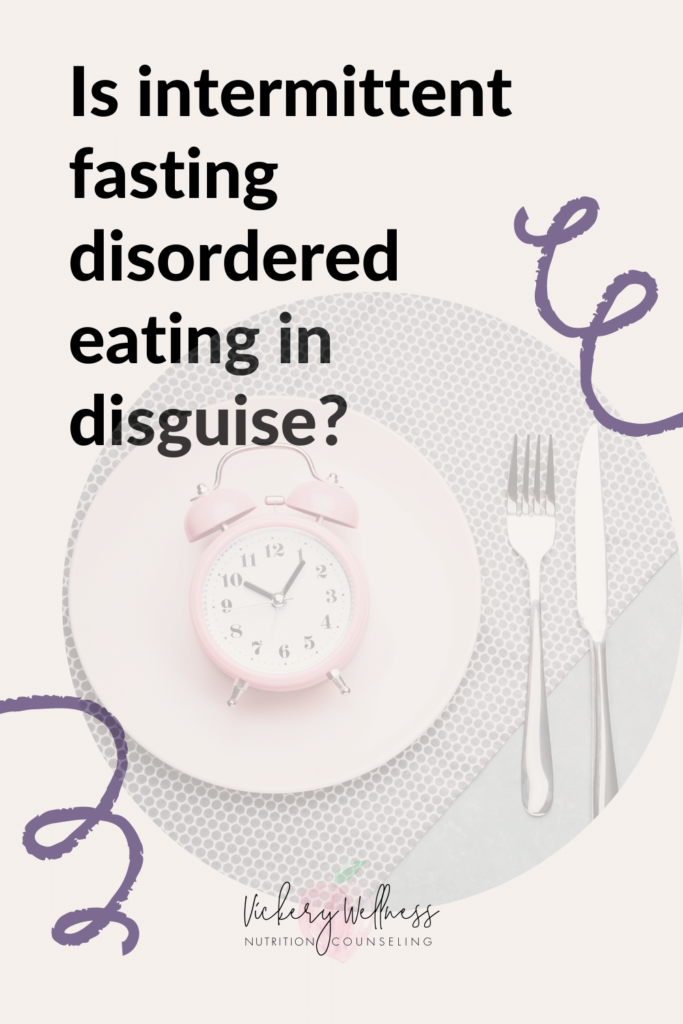It’s one of the most popular diet trends in America. It promises weight loss, more energy, and better health. But, for many women struggling with a history of disordered eating, intermittent fasting can feel like a slippery slope to relapse.
What is intermittent fasting?
The simplest way to explain it would be as follows: Intermittent fasting simply means that you go without food for an extended period of time- anywhere from 16 hours to 36 hours- during which time you only drink water or tea.
Fasting has been part of cultural and religious tradition for centuries. Today, fasting remains a ritualistic practice in many faiths. These include Judaism, Islam, Hinduism, and Jainism among others. The customs vary in the type of food permitted during fasts, which restricts the person to one or two meals per day. This lasts up to three days at most. Some will abstain from all food during this time. Yet, others will only limit themselves from eating any solid foods.
How did intermittent fasting become a dieting trend?
It’s no surprise that intermittent fasting is the latest diet trend. It was first introduced by Dr. Michael Mosley in his bestselling book, “The Fast Diet: Lose Weight and Get Healthy With Just Two Days a Week of Fasting.” The 5:2 protocol consists of two nonconsecutive days where you consume X* calories each day (X* for men) while five other days involve eating normally with unlimited food intake. (*Calories are omitted to protect those in eating disorder recovery).

Does intermittent fasting have any positive benefits?
Proponents of IF attribute it to countless benefits, including weight and abdominal fat loss, reduced insulin resistance, reduced inflammation, and decreased risk of heart disease. One Healthline article even goes on to say, “IF changes the function of cells, genes, and hormones.” Not only is that an enormous claim, but it is also misleading. Dietary changes, in general, may alter gene expression, but not the function of the genes themselves. Similarly, diet cannot change the function of the body’s cells or hormones. Nutrient intake may affect cell activity and hormone levels, but it does not change the inherent purpose of our bodies’ physiological processes.
So, let’s investigate the evidence people use to make these claims. Beyond the physical impacts of IF, what separates it from eating disorder behavior? Is there a difference?
The vast majority of research on IF comes from animal studies. The Healthline article from above uses rodent studies to support nearly all of its claims, but these studies can only make assumptions about human results. Researchers have long acknowledged the problems of extrapolating animal data to human subjects, as it raises ethical and methodological concerns. Research on the effects of IF in humans is severely lacking, and studies are too few to produce conclusive results. A few studies have produced measurable effects in specific groups, like individuals with type-2 diabetes, but most conclude that there is no evidence base for IF as an intervention to improve the health of the general population.
Unsurprisingly, IF has been linked to negative psychological impacts. Increased disordered eating symptomology, the development of eating disorders, impaired sleep and digestion, and hormone imbalance have all been shown in participants of IF. Individuals with eating disorders or disordered eating behavior are especially at-risk. Elisa Klein, MSW, MPH, LCSWA remarks, “Intermittent fasting does not seem all that different from bulimia.”She calls IF a “fast track to disordered eating.”
“Intermittent fasting does not seem all that different from bulimia. It is a “fast track to disordered eating.”
Elisa Klein, MSW, MPH, LCSWA
IF glamorizes restriction and disordered behavior
No matter the physical impacts of intermittent fasting, marketing severe energy restriction as a diet is dangerous. Intermittent fasting directly opposes the idea of honoring your physical hunger cues and trusting your body. Intermittent fasting now joins the laundry list of trendy diets that glamorize restriction and disordered behavior.
Want some help getting started on your journey to food freedom? Check out some of my free intuitive eating and body acceptance resources.
References
This article was written by Caroline Jones, UGA Dietetic student and edited by Courtney Vickery, MS, RD, LD.
[1] Patterson RE, Laughlin GA, LaCroix AZ, et al. Intermittent Fasting and Human Metabolic Health. J Acad Nutr Diet. 2015;115(8):1203-12. doi:10.1016/j.jand.2015.02.018
[2] Gunnars K. Healthline. 10 Evidence-Based Health Benefits of Intermittent Fasting. Version current 16 August 2016. Internet: https://www.healthline.com/nutrition/10-health-benefits-of-intermittent-fasting.
[3] Ram R. Extrapolation of Animal Research Data to Humans: An Analysis of the Evidence. In: Animal Experimentation: Working Towards a Paradigm Change. 2019;22:341-75. doi:10.1163/9789004391192_016
[4] Klein E. UNC Center of Excellence for Eating Disorders. Intermittent Fasting: A fast track to disordered eating? Version current 13 December 2016. Internet: https://uncexchanges.org/2016/10/26/intermittent-fasting-a-fast-track-to-disordered-eating/.








0 Comments